Omagh bomb service 'testament to community spirit' 25 years on
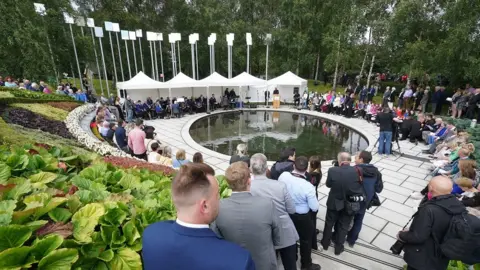 Brian Lawless
Brian LawlessRelatives and friends of those who died in the Omagh bomb have remembered their loved ones at a special service on the 25th anniversary of the atrocity.
It was the greatest single loss of life in the history of the Northern Ireland Troubles.
Michael Gallagher, whose son Aiden, 21, was killed in the bombing said Sunday's service showed people were unified.
He said the attendance was a "powerful testimony to community spirit and cohesion 25 years after our small town was ripped apart".
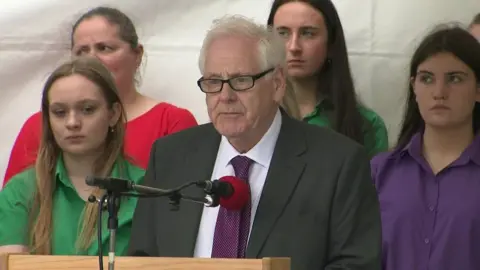
He also paid tribute to Fr Kevin Mullan, who died in May of this year. He said the priest had helped "rebuild hearts and minds" in the wake of the bomb.
No one has ever been convicted of carrying out the attack.
In February, the UK government announced an independent statutory inquiry into the Omagh bombing.
Bereaved families had been campaigning for an inquiry for more than a decade.
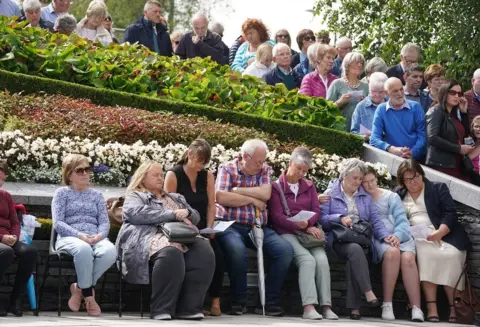 Brian Lawless
Brian LawlessSunday's commemoration had been organised by Omagh Support and Self-Help Group, Families Moving On and the Omagh Churches' Forum.
They said it was an opportunity for people to come together to remember the victims and survivors in a peaceful and supportive environment.
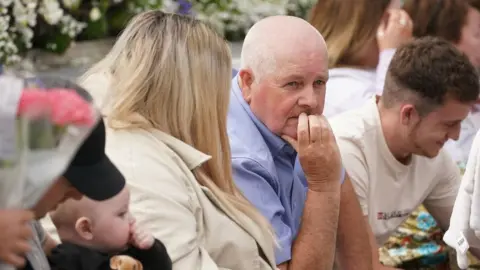 Brian Lawless
Brian LawlessThe service took place in the town's memorial garden and consisted of music, prayer and reflection with contributions from the local community.
Donna Marie McGillion, who was severely injured in the explosion alongside her husband Gary, said the milestone anniversary also reflected survivors' struggles.
"It's always very important to remember those who were with us in town that day, those who are struggling, those who have found ways to cope because you never really get over it."
Stanley McCombe, who lost his wife Ann in the bombing, laid a wreath at the memorial on Sunday.
"Twenty-five years seems a long time, it is a long time but it's just like yesterday," he told BBC News NI.
Northern Ireland Office minister Jonathan Caine, who represented the British government, said it was to important to reflect on an "absolutely appalling, hideous" attack.
The Irish government was represented by Minister of State for European Affairs and Defence Peter Burke.
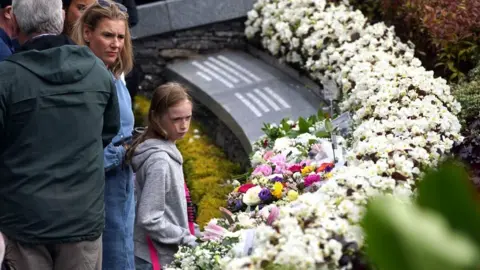 PA Media
PA MediaHe added: "It's very important for us all to understand that peace needs advocates, we need so many people across all strands of our communities never to take peace for granted."
Prayers were read in English, Irish and Spanish to reflect the nationalities of those who died.

What happened at Omagh?
A large car bomb exploded in the centre of the town on Saturday 15 August 1998.
It happened four months after the signing of the Good Friday Agreement, the peace deal that eventually brought an end to decades of violence known as the Troubles.
It was carried out by dissident republican group the Real IRA, which split from the much larger Provisional IRA after objecting to its ceasefire of 1997.
Real IRA leader Michael McKevitt, who died in 2021, was found responsible for the Omagh bombing in a civil case in 2009, with three other men - Liam Campbell, Colm Murphy and Seamus Daly - also being found liable for the attack.
The four men were named by Mr Justice Morgan in a ruling made as part of a landmark case taken by some of the families of the victims.
The 12 relatives were awarded more than £1.6m in damages for the attack.

'First atrocity of peace time'
Speaking ahead of the service, Mr Gallagher said the 25th anniversary was an "extremely difficult" time.
"They talk about this as being the worst atrocity of the Troubles, in fact, it was the first atrocity of peace time.
"But for us, and for all the other people that lost family members, it was a personal, individual family tragedy."
He said the service and the demonstration of unity would provide them with comfort.
"We weren't two communities on the 15th of August, we were one community."
Intense hurt remains
Father Eugene Hasson, the co-chair of Omagh Churches' Forum, was the chaplain of Tyrone County Hospital in 1998.
In the aftermath of the bomb, he went to the crisis centre at Omagh leisure centre where relatives gathered to await news.
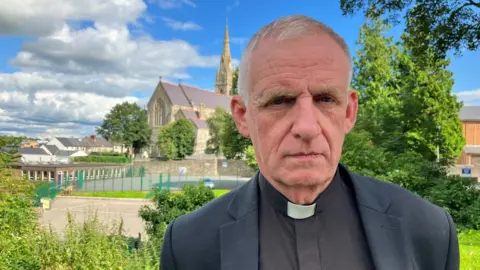
"Many of us have been involved 25 years ago, and many others are new to the area and, for them, the Omagh bomb experience is a moment of history rather than a moment of experience of life," said Fr Hasson.
"Naturally, the intensity of the hurt of 25 years ago will not be as acute for some people as it is for others, but it's there and we acknowledge that.
"And we also acknowledge that there is also hope, people move forward, people desire peace, people want to move forward and they want healing, and that's a personal thing and certainly a community thing, too.
"There is great resilience in people here."
Next Tuesday, the actual date of the 25th anniversary of the bombing, a short private service at Omagh library has been organised by Families Moving On.
Relatives will then be invited to lay flowers at the glass obelisk memorial that stands on the site of the bomb on Market Street.
